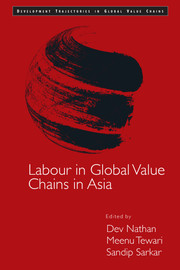Book contents
- Frontmatter
- Contents
- Figures
- Tables
- Foreword
- Preface
- Acknowledgements
- Introduction
- Captive Governance
- Modular Governance
- 11 From Disposable to Empowered: Rearticulating Labour in Sri Lankan Apparel Factories
- 12 Scripted Performances? Local Readings of ‘Global’ Health and Safety Standards in the Apparel Sector in Sri Lanka
- 13 Diffusing Labour Standards Down and Beyond the Value Chain: Lessons from the Mewat Experiment
- 14 Social Upgrading in Mobile Phone GVCs: Firm-level Comparisons of Working Conditions and Labour Rights
- 15 The Politics of Global Production: Apple, Foxconn and China's New Working Class
- 16 New Strategies of Industrial Organization and Labour in the Mobile Telecom Sector in India
- 17 Global Production Networks and Labour Process
- Relational Governance
- Conclusions
- Notes on Contributors
- Index
16 - New Strategies of Industrial Organization and Labour in the Mobile Telecom Sector in India
from Modular Governance
Published online by Cambridge University Press: 23 July 2017
- Frontmatter
- Contents
- Figures
- Tables
- Foreword
- Preface
- Acknowledgements
- Introduction
- Captive Governance
- Modular Governance
- 11 From Disposable to Empowered: Rearticulating Labour in Sri Lankan Apparel Factories
- 12 Scripted Performances? Local Readings of ‘Global’ Health and Safety Standards in the Apparel Sector in Sri Lanka
- 13 Diffusing Labour Standards Down and Beyond the Value Chain: Lessons from the Mewat Experiment
- 14 Social Upgrading in Mobile Phone GVCs: Firm-level Comparisons of Working Conditions and Labour Rights
- 15 The Politics of Global Production: Apple, Foxconn and China's New Working Class
- 16 New Strategies of Industrial Organization and Labour in the Mobile Telecom Sector in India
- 17 Global Production Networks and Labour Process
- Relational Governance
- Conclusions
- Notes on Contributors
- Index
Summary
Introduction
It has been argued for several years now that the phenomenon of ‘global production sharing’ through global value chains (GVCs) has helped developing countries expand export-oriented manufacturing activity. GVCs represent the significant unit of organization of international production, wherein ‘lead firms’, largely multinational corporations (MNCs), coordinate production across international borders through extensive networks of suppliers spread across large numbers of countries. This has resulted in a significant change in the structure of international trade, leading to a domination of what has been referred to as the ‘trade in tasks’, that is, trade is no longer characteristically undertaken in goods, but rather in particular production segments of a production chain (Grossman and Rossi-Hansberg, 2006). The ‘trade in tasks’, empirically measured in terms of trade in intermediate goods, reflects this phenomenon, and the increased involvement of low- and middle-income countries in trade is clearly seen here, with their share constituting more than 35 per cent of the world's intermediate goods trade during the latter half of the 2000s (UNCTAD, 2013).
However, it has also been noted extensively that, despite increases in export shares, involvement in GVC-coordinated activities has often not led to any significant increase in value added from those activities over previous commodity-based export regimes, because lead firms in global production networks (GPNs) outsource lower value-added activities while retaining control over production in the higher value-added areas of their ‘core competency’. These areas, often characterized by higher technological and skill requirements, are also commonly oligopolistic and subject to significant barriers to entry, whereas the lower value-added segments of many GVCs have low entry barriers and constitute ongoing entry by firms into countries that previously did not produce those products (Milberg, 2004; Milberg and Winkler, 2013). To what extent is it possible for developing countries to counter the tendencies towards lower-end concentration in GVCs, often characterized by poor employment conditions and wage stagnation, which affects the standard of living of people engaged in the sector? To what extent is it possible to capture rents in different segments and thus allow for the reinvestment that is one of the major challenges in longer-term economic development? Even if the former, commonly referred to as ‘economic upgrading’, happens, what is required for it to translate into social upgrading, or the expansion of employment accompanied by improvement in its quality?
- Type
- Chapter
- Information
- Labour in Global Value Chains in Asia , pp. 377 - 397Publisher: Cambridge University PressPrint publication year: 2016



